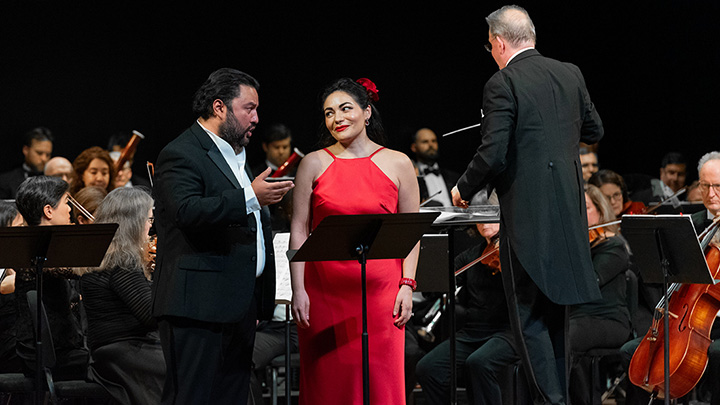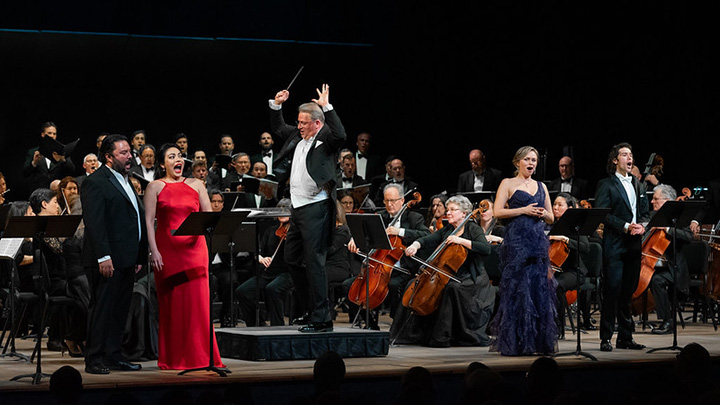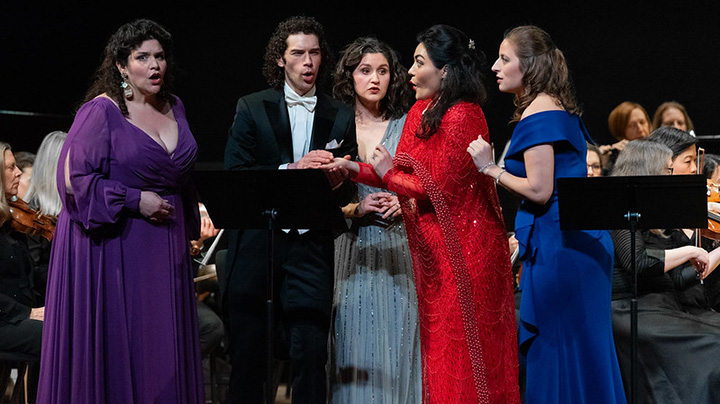In La rondine, Pérez flies high, soaring to crisp, dreamy notes and plunging to emotional depths this past Sunday at Washington Concert Opera’s presentation of Puccini’s oft-forgotten La rondine. The second Puccini in WCO’s forty-year history, La rondine is a triumphant preview of what could be if Pérez is given a full staging in the U.S..
We meet this Magda in her salon where the poet Prunier – an aptly pretentious Jonathan Johnson – declares that romantic love is back and better than ever. A trio of Magda’s friends tease him, as does her maid (and his lover), Lisette, but Magda takes him seriously. Prunier declares that no one can save themselves from this epidemic of love, even Doretta, leading us to the signature aria of the piece. Pérez does not squander a second of her turn as Magda, ascending the climactic minor third intervals and floating her voice gracefully to the aria’s apex. Though vocally perfect, it is her acting – imbued with the nuance of a kept woman dreaming of true love – that makes her “Canzone di Doretta” so magnetic and arresting. Sunday’s audience could not be tamed when she finished, erupting into mid-performance applause.
Rambaldo, Magda’s sugar daddy played by a refined Javiery Arrey, gifts her pearls that perfectly complemented Pérez’s couture scarlet dress. Monochromatic and accented with art deco-inspired beadwork and a perfectly matched bold lip, this first gown and capelet encapsulate what Rambaldo provides Magda – stability, wealth, extravagance. Her gaggle of girls are gagged by this gift, remarking, “No one’s fortunate as you!”
“Who cares for fortune!” Magda replies in her lavish Paris salon, thus leading us to, “Ore dolci e divine,” complete with its signature waltz that reprises whenever Magda is in her more reflective moments. She finds herself so tempted by this ideal of romantic love that she changes into a simpler, but still divine, silk dress complete with one flower in her hair to disguise herself at Bullier’s, where college boys apparently hang out to pick up chicks. Pérez, in all her charms, asks the audience if she looks okay as she leads us right into Act II.
WCO Artistic Director and Conductor Antony Walker brings vigor to the podium – so much so that a rather endearing jump in Act II had me worried he’d tumble into the violinists. He brings a deep understanding and familiarity to the piece which some soloists seemed to lack. The benefit of Washington Concert Opera is in the opportunity for imagination it provides to its audiences – with WCO, we can project the staging we want to see in the world, but the Washington Concert Opera Orchestra and Walker perform the text to leave no ambiguity – this opera is “worthy of a regular place in the operatic canon” as Walker writes in his message from the Artistic Director.
Giusseppe Adami’s libretto – based on Die Schwalbe by Alfred Maria Willner and Heinz Reichert – works overtime to put a price on love, for Magda and for the other characters, including Lisette and Prunier, whose love affair is tested by her turn on the stage. Prunier wanted to transform Lisette – a savvy and hilarious Deanna Breiwick – into the ideal woman, but she cannot live up to his expectation of her. Breiwick – whose high notes are as dynamic as her comedic timing – brings a frantic energy to Lisette that works in contrast with Pérez’s grounded Magda. As Lisette settles back into the life of a maid after her dramatic turn, Magda witnesses her happy return to status quo, and she too starts to consider if her new life on the riviera is worth the sacrifice of luxury. In Act III, Pérez has donned a turquoise gown with earrings to match that ripple like the sea, signifying her stark turn from the scarlet woman of Act I. Can this woman, now changed, marry innocent Ruggero, as played by a sweet and sturdy Mario Chang?
No. But it is neither riches nor shame that ultimately prevent Magda from marrying the humble Ruggero: it is the motherhood he asks her to take on without much thought to how it might affect her. La rondine sets itself apart from the crowd of dreary endings for heroines, letting Magda live after leaving her romantic fantasy with Ruggero. While Chang and Pérez have a lively, believable chemistry, it is not enough to make me root for her to give up the life she has built in Paris – the job security, the intellectual pursuits, the freedom her swallow craves. Though often compared to Verdi’s La traviata, La rondine makes it possible for this version of Violetta to live and to live freely instead of being a mommy-girlfriend to a guy without a job.
As Chang sings of Magda-as-mother, the panic seems to set in for her: this is not the life she wants. Chang’s bel canto tenor has a gentle richness that gained in urgency as his Ruggero begs Magda to stay, but the romantic ideal is not enough for Magda. Though it may have something to do with him not knowing her true past, it is also clear that Magda does not desire or dream of the motherly life Ruggero describes. As she prepares to leave him, she comforts Ruggero, saying, “Let me speak to you like a mother to a dear son…you return to your peaceful home, I return to my flight of pain.” Sure, the swallow flies away to be a courtesan, but at least she doesn’t have to change diapers or go through life-threatening childbirth before epidurals. It’s a heartbreaking ending, but for whom?
Pérez stakes a claim on Magda and makes the character’s journey her own: her decision, her life, her flight back to Rambaldo. Because of her bright vocals, the journey of Magda’s musings is supported by a clarity that lends itself well to the text: this is a woman who is sure, who is clear about the path she wants to take in abandoning Ruggero in this heartbreaking, but gratefully not fatal, ending.
Puccini reportedly struggled with this ending and wrote two more before his death, but this first ending is powerful and representative of the difficult choices women face all the time: between finance and love, between sexual exploitation and poverty, and between a hot, penniless guy and an old fogey with a 401k and stock options.
For the centenary of Giacomo Puccini’s death, WCO will bring us more Puccini this fall with the announcement of Manon Lescaut to follow in November. Their 2024-2025 season will also feature Mozart’s La clemenza di Tito and Verdi’s Luisa Miller featuring the Met’s current Magda, Angel Blue.
Photos: Caitlin Oldham






